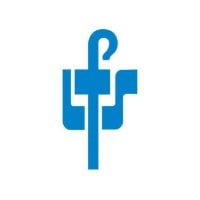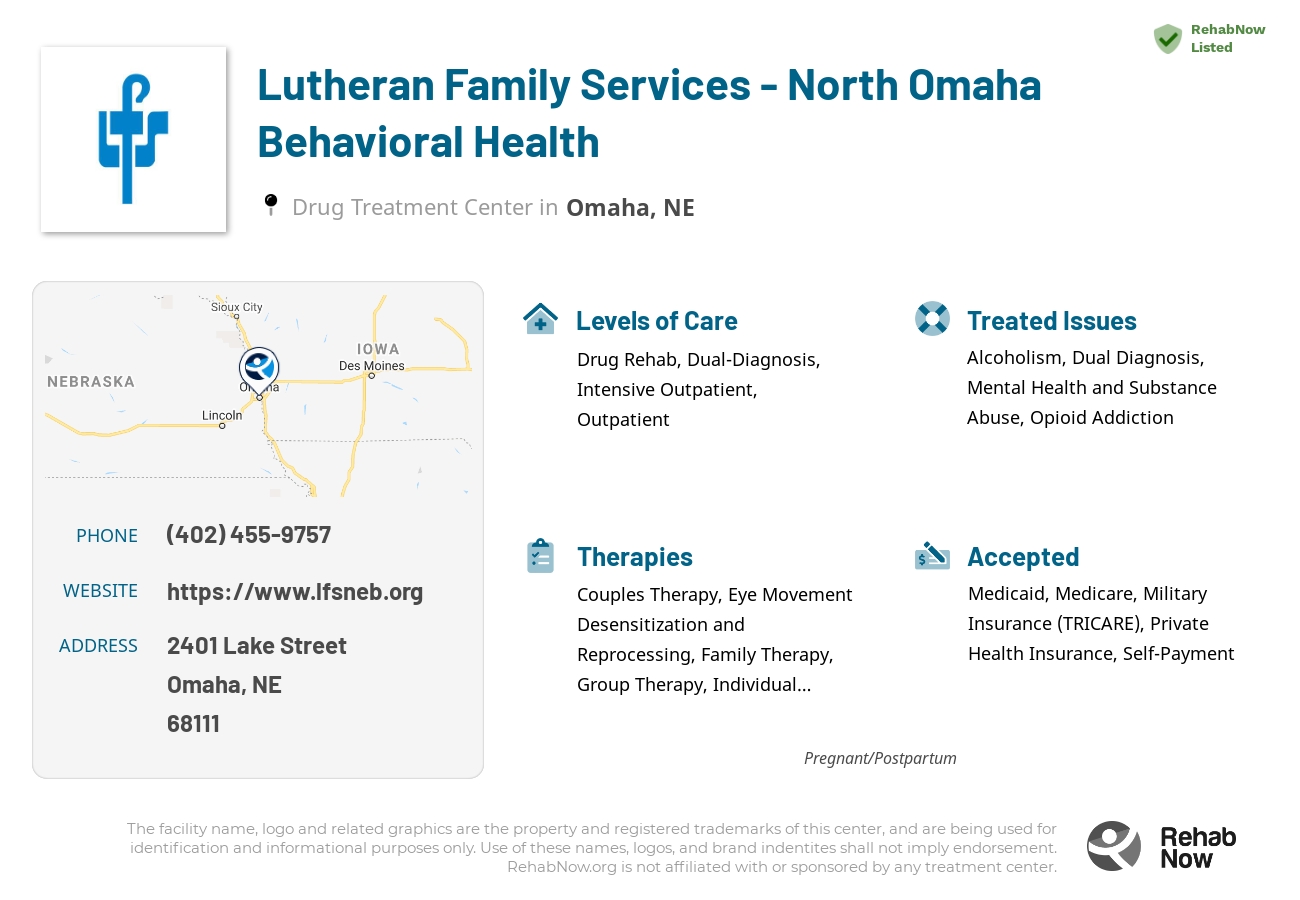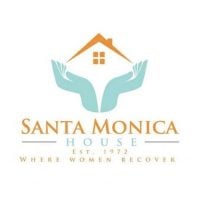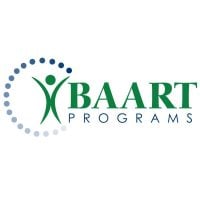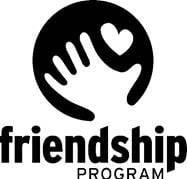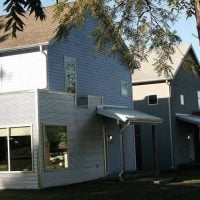Lutheran Family Services - North Omaha Behavioral Health
Drug Rehab Center in Omaha, Nebraska
Lutheran Family Services - North Omaha Behavioral Health is an addiction treatment facility that offers comprehensive care through various levels of drug rehab, utilizing evidence-based treatment methods, psychological therapies and medications as necessary, to help individuals and families achieve long-term sobriety.
About This Nebraska Facility
Lutheran Family Services - North Omaha Behavioral Health is a treatment facility located in Omaha, Nebraska that specializes in providing support and assistance to individuals struggling with alcoholism, opioid addiction, dual diagnosis, drug addiction, substance abuse, and mental health issues. With a focus on helping people overcome their challenges and achieve sobriety, this facility offers various levels of care, including drug rehabilitation, dual-diagnosis treatment, intensive outpatient programs, and outpatient services. As a testament to their dedication to helping individuals on their journey to recovery, Lutheran Family Services - North Omaha Behavioral Health accepts private health insurance and is affiliated with Lutheran Family Services, a trusted organization in the field of behavioral health.
Lutheran Family Services - North Omaha Behavioral Health offers a range of comprehensive treatment services for addiction and substance abuse. Their treatment approach addresses the specific needs of each individual, considering factors such as co-occurring mental health disorders and the severity of addiction. Through their programs, individuals can benefit from various evidence-based treatment methods, including therapy sessions, counseling, group support, and educational workshops. The facility emphasizes a holistic approach to recovery, providing resources for physical, emotional, and psychological healing. By offering a combination of personalized care and professionally guided treatment methods, Lutheran Family Services - North Omaha Behavioral Health strives to empower individuals to overcome their addiction and achieve long-term sobriety.
Genders
Ages
Modality
Additional
Conditions and Issues Treated
Substance abuse is defined by the continued use of drugs or alcohol despite negative consequences, such as legal or work problems. It can be treated using a variety of services, including therapy and medication.
Substance abuse treatment is beneficial for:
- People who have been using drugs or alcohol for a long time.
- People who have been using drugs or alcohol to cope with stress, anxiety, or depression.
- People who have a mental health disorder in conjunction with substance abuse.
- People who continue to use drugs or alcohol despite the harmful effects they cause on their own life and the lives of others.
- People who have had multiple failed attempts at recovery without medical assistance.
If you believe that addiction treatment is right for you or a loved one, you can contact your primary care physician, or search for addiction treatment centers in your area. Treatment is beneficial to people who are motivated towards recovery, and who understand the benefits of professional care.
Opioid addiction is the result of repeated use, or abuse, of opioid drugs. It is recommended for people who are dependent on opioids, or who have a high risk for dangerous health concerns, to seek professional treatment. Treatment plans usually include behavioral therapy and medication-assisted treatment.
Opioid drugs include: fentanyl, heroin, methadone, oxycodone, and oxymorphone.
Opioid addiction treatment is beneficial for:
- People who have a history of severe withdrawal.
- People with a high risk for dangerous health concerns.
- People having difficulty overcoming opioid addiction on their own.
There are different kinds of Dual Diagnosis:. A person who simultaneously experiences both a mental illness and an addiction disorder. Or, a person who experiences one or more coexisting (simultaneous) mental health conditions in addition to a primary substance use disorder.
The treatment requires a multi-disciplinary approach, it’s crucial for individuals to partner up with a healthcare provider who understands all the recovery components.
Levels of Care Offered at Lutheran Family Services - North Omaha Behavioral Health
This center offers a variety of custom treatment tailored to individual recovery. Currently available are Drug Rehab, Dual-Diagnosis, Intensive Outpatient, Outpatient, with additional therapies available as listed below.
An Intensive Outpatient Program (IOP) is a form of drug treatment that allows individuals to receive the therapy they need while remaining in their homes and community.
An IOP is typically 3-5 days per week, at least 4 hours each day of treatment. Treatment can last for a few months or longer, depending on the situation.
An IOP is a step down from an inpatient treatment center and can be used as a step down from an inpatient stay or as a more intense form of outpatient treatment. IOPs allow for the flexibility to continue working and living at home while still meeting treatment demands.
The outpatient programs in Omaha, NE are for those addicted drugs or alcohol. The goal of the outpatient rehabilitation program is to make them stop abusing drugs or alcohol, reduce drug use or addictive behaviors, and become entirely sober. It is generally required to attend the outpatient program for 10-12 hours every week.
Patients can be administered on-the-spot medication to ease withdrawal symptoms such as anxiety, increased heart rate, and even depression. Groups such as Alcoholics Anonymous (AA) and Narcotics Anonymous (NA) can be used as a part of outpatient treatment to help maintain sobriety.
Therapies & Programs
People in addiction recovery can benefit from individual therapy. This type of therapy involves meeting with a therapist one-on-one. This allows for a personal and trusting relationship to be built so that the patient can be truly themselves and express any emotions they feel. Individual therapy leads to greater understanding and peace about your triggers for addiction and coping strategies to prevent relapse.
Couples therapy for drug addiction is based on the belief that addiction is a family disease. Everyone involved with an addict, not just the addict themselves, is affected by their behavior and the changes the addict goes through. The relationship also changes the addict’s significant other and has likely picked up some codependent behaviors. Codependency is a term used to describe a person obsessed with another person and their needs and feelings while neglecting their own. Addicts are usually people-pleasers, so it is understandable how one can become codependent in relationships with addicts.
Family therapy is a type of group problem-solving that aims to improve communication and relationships between the patient, their family, and sometimes friends. The main goal of family therapy for drug addiction is to create an environment where communication can occur without judgment, hostility, or blame. The therapist is with the family as they learn to communicate with each other differently, especially with the addict when s/he is using.
Group therapy sessions are held in rehab facilities, clinics, churches or community centers that offer drug addiction treatment. People who attend these groups are encouraged to voice their feelings and support other addicts in recovery. This helps group members strengthen their own recovery program while cheering on others who are struggling with sobriety.
Group therapy sessions provide recovering addicts with a chance to cope with everyday situations that many face. Group therapy sessions are held in rehab facilities, clinics, churches or community centers that offer drug addiction treatment.
People who attend these groups are encouraged to voice their feelings and support other addicts in recovery. This helps group members strengthen their own recovery program while cheering on others who are struggling with sobriety.
If you’re looking for addiction treatment, it’s important to find a facility that offers trauma therapy. This type of therapy helps people process and understand the past traumas that have led to their addiction. Trauma therapists will work with clients to help them understand their past and present relationships and show them that they are worthy of love. This therapy is typically done using visualization, discussion, and writing down thoughts and feelings.
Trauma Therapy is a form of therapy that involves working with a patient to help them process and understand the past trauma(s) in their life. This therapy is typically done using techniques such as visualization, discussion, and writing down thoughts and feelings. The main goals of trauma therapy is to help clients express their emotions and talk about what they are feeling.
Eye Movement Desensitization and Reprocessing (EMDR) is an integrative psychotherapy approach that has been extensively studied and proven effective for treating trauma. EMDR sessions typically last 50-90 minutes and can be completed in as little as 12-15 sessions. EMDR is a goal-directed therapy in which the client works with the therapist to develop an individualized treatment plan that focuses on specific trauma memories and associated disturbance.
Payment Options Accepted
For specific insurance or payment methods please contact us.
Is your insurance accepted?
Ask an expert, call (888) 674-0062
Lutheran Family Services Associated Centers
Discover treatment facilities under the same provider.
- Lutheran Family Services - Children Services Center in Omaha, NE
- Lutheran Family Services - Child Advocacy Center in Lincoln, NE
- Lutheran Family Services - Connections Building in Omaha, NE
- Lutheran Family Services - North Omaha for Healthy Families in Omaha, NE
- Lutheran Family Services - Partners in Empowerment and Recovery in Lincoln, NE
Learn More About Lutheran Family Services Centers
Additional Details
Specifics, location, and helpful extra information.
Omaha, Nebraska 68111 Phone Number(402) 455-9757 Meta DetailsUpdated November 25, 2023
Staff Verified
Patient Reviews
There are no reviews yet. Be the first one to write one.
Omaha, Nebraska Addiction Information
Despite a total population of slightly less than 2 million residents, methamphetamines are one of the most commonly abused illicit substances in the state. Alcohol abuse is so common that a news article once referred to Nebraska as "America's 9th drunkest state". Although opioid abuse rates in Nebraska are not as high as those in other states, opioids are still involved in most overdoses.
Omaha, NE has been hit hard by drug addiction and abuse in recent years. About 5% of the population is addicted to drugs or alcohol. Marijuana is the most commonly abused drug in Omaha. In 2017, there were 936 people admitted to treatment centers for marijuana abuse. Crime rates have gone up, and there have been more cases of child abuse and neglect.
Treatment in Nearby Cities
- Norfolk, NE (91.9 mi.)
- Auburn, NE (61.6 mi.)
- York, NE (90.4 mi.)
- Pawnee City, NE (81.6 mi.)
- Blair, NE (20.7 mi.)
Centers near Lutheran Family Services - North Omaha Behavioral Health
The facility name, logo and brand are the property and registered trademarks of Lutheran Family Services - North Omaha Behavioral Health, and are being used for identification and informational purposes only. Use of these names, logos and brands shall not imply endorsement. RehabNow.org is not affiliated with or sponsored by Lutheran Family Services - North Omaha Behavioral Health.
